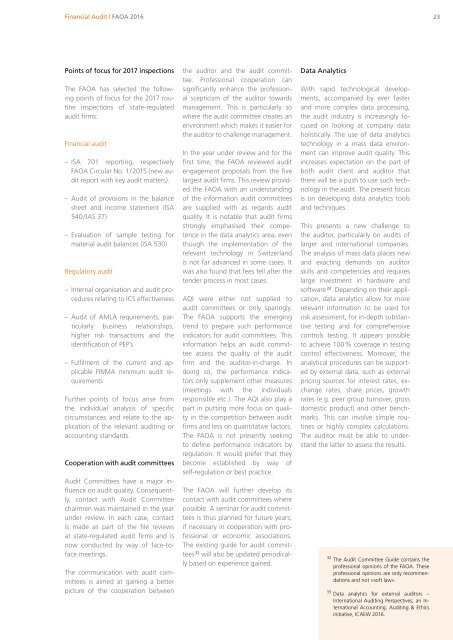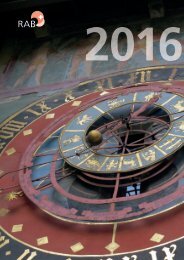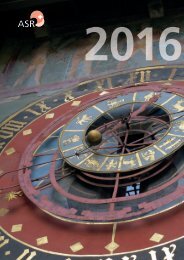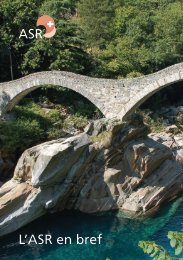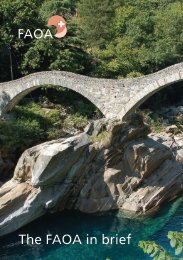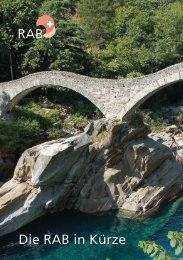Annual Report 2016
Annual Report 2016 - Federal Audit Oversight Authority FAOA
Annual Report 2016 - Federal Audit Oversight Authority FAOA
- No tags were found...
Create successful ePaper yourself
Turn your PDF publications into a flip-book with our unique Google optimized e-Paper software.
Financial Audit | FAOA <strong>2016</strong><br />
23<br />
Points of focus for 2017 inspections<br />
The FAOA has selected the following<br />
points of focus for the 2017 routine<br />
inspections of state-regulated<br />
audit firms:<br />
Financial audit<br />
– ISA 701 reporting, respectively<br />
FAOA Circular No. 1/2015 (new audit<br />
report with key audit matters).<br />
– Audit of provisions in the balance<br />
sheet and income statement (ISA<br />
540/IAS 37)<br />
– Evaluation of sample testing for<br />
material audit balances (ISA 530)<br />
Regulatory audit<br />
– Internal organisation and audit procedures<br />
relating to ICS effectiveness<br />
– Audit of AMLA requirements, particularly<br />
business relationships,<br />
higher risk transactions and the<br />
identification of PEP’s<br />
– Fulfilment of the current and applicable<br />
FINMA minimum audit requirements<br />
Further points of focus arise from<br />
the individual analysis of specific<br />
circumstances and relate to the application<br />
of the relevant auditing or<br />
accounting standards.<br />
Cooperation with audit committees<br />
Audit Committees have a major influence<br />
on audit quality. Consequently,<br />
contact with Audit Committee<br />
chairmen was maintained in the year<br />
under review. In each case, contact<br />
is made as part of the file reviews<br />
at state-regulated audit firms and is<br />
now conducted by way of face-toface<br />
meetings.<br />
The communication with audit committees<br />
is aimed at gaining a better<br />
picture of the cooperation between<br />
the auditor and the audit committee.<br />
Professional cooperation can<br />
significantly enhance the professional<br />
scepticism of the auditor towards<br />
management. This is particularly so<br />
where the audit committee creates an<br />
environment which makes it easier for<br />
the auditor to challenge management.<br />
In the year under review and for the<br />
first time, the FAOA reviewed audit<br />
engagement proposals from the five<br />
largest audit firms. This review provided<br />
the FAOA with an understanding<br />
of the information audit committees<br />
are supplied with as regards audit<br />
quality. It is notable that audit firms<br />
strongly emphasised their competence<br />
in the data analytics area, even<br />
though the implementation of the<br />
relevant technology in Switzerland<br />
is not far advanced in some cases. It<br />
was also found that fees fell after the<br />
tender process in most cases.<br />
AQI were either not supplied to<br />
audit committees or only sparingly.<br />
The FAOA supports the emerging<br />
trend to prepare such performance<br />
indicators for audit committees. This<br />
information helps an audit committee<br />
assess the quality of the audit<br />
firm and the auditor-in-charge. In<br />
doing so, the performance indicators<br />
only supplement other measures<br />
(meetings with the individuals<br />
responsible etc.). The AQI also play a<br />
part in putting more focus on quality<br />
in the competition between audit<br />
firms and less on quantitative factors.<br />
The FAOA is not presently seeking<br />
to define performance indicators by<br />
regulation. It would prefer that they<br />
become established by way of<br />
self-regulation or best practice.<br />
The FAOA will further develop its<br />
contact with audit committees where<br />
possible. A seminar for audit committees<br />
is thus planned for future years,<br />
if necessary in cooperation with professional<br />
or economic associations.<br />
The existing guide for audit committees<br />
32 will also be updated periodically<br />
based on experience gained.<br />
Data Analytics<br />
With rapid technological developments,<br />
accompanied by ever faster<br />
and more complex data processing,<br />
the audit industry is increasingly focused<br />
on looking at company data<br />
holistically. The use of data analytics<br />
technology in a mass data environment<br />
can improve audit quality. This<br />
increases expectation on the part of<br />
both audit client and auditor that<br />
there will be a push to use such technology<br />
in the audit. The present focus<br />
is on developing data analytics tools<br />
and techniques.<br />
This presents a new challenge to<br />
the auditor, particularly on audits of<br />
larger and international companies.<br />
The analysis of mass data places new<br />
and exacting demands on auditor<br />
skills and competencies and requires<br />
large investment in hardware and<br />
software 33 . Depending on their application,<br />
data analytics allow for more<br />
relevant information to be used for<br />
risk assessment, for in-depth substantive<br />
testing and for comprehensive<br />
controls testing. It appears possible<br />
to achieve 100% coverage in testing<br />
control effectiveness. Moreover, the<br />
analytical procedures can be supported<br />
by external data, such as external<br />
pricing sources for interest rates, exchange<br />
rates, share prices, growth<br />
rates (e.g. peer group turnover, gross<br />
domestic product) and other benchmarks.<br />
This can involve simple routines<br />
or highly complex calculations.<br />
The auditor must be able to understand<br />
the latter to assess the results.<br />
32 The Audit Committee Guide contains the<br />
professional opinions of the FAOA. These<br />
professional opinions are only recommendations<br />
and not «soft law».<br />
33 Data analytics for external auditors –<br />
International Auditing Perspectives; an International<br />
Accounting, Auditing & Ethics<br />
initiative, ICAEW <strong>2016</strong>.


